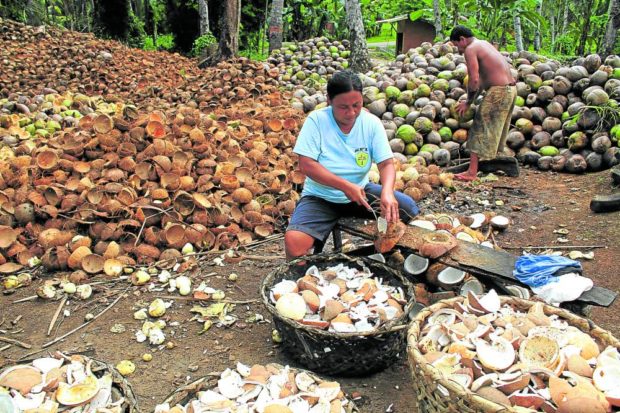Gov’t may now tap P75-billion coco levy fund for farmers

Coconut farmers in the village of Robocon in Linamon, Lanao del Norte province. (File photo by RICHEL V. UMEL / Inquirer Mindanao)
MANILA, Philippines — Just weeks before ending his term, President Rodrigo Duterte issued an executive order that will pave the way for the government to finally tap the multibillion-peso coco levy fund to revive and modernize the country’s coconut industry.
On June 2, \Duterte signed Executive Order (EO) No. 172, or the Coconut Farmers and Industry Development Plan (CFIDP), to serve as basis in using the P75-billion coco levy fund through various programs and projects.
The CFIDP, which is to be reviewed annually, aims “to increase overall productivity and income of coconut farmers, alleviate poverty, and achieve the twin objectives of rehabilitating and modernizing the coconut industry to attain social equity,” the directive read.
It mandates the Philippine Coconut Authority (PCA) and other concerned agencies to implement the plan, which will be updated every five years, subject to the President’s approval.
Funds for implementing the coconut industry blueprint will be taken from the Coconut Farmers and Industry Trust Fund (CFITF) as stipulated under Republic Act No. 11524, a piece of legislation signed by Mr. Duterte in February last year creating the fund using the recovered coco levy assets.
Article continues after this advertisementFrom 1971 to 1982, the government under the late dictator Ferdinand Marcos collected money from coconut farmers by imposing levies, taxes, charges and other fees for selling copra. The collections were supposed to build up a fund to finance coconut research, extension and credit services and other programs and projects to benefit the coconut industry in general.
Article continues after this advertisementHowever, subsequent lawsuits filed by coconut farmers, with the help of the Presidential Commission on Good Government (PCGG), after Marcos fled in 1986 alleged that cronies of the Marcos administration diverted the funds to finance their own business interests, to the detriment of the millions of coconut farmers.
The Supreme Court, however, issued a ruling in 2012 that settled the ownership of the coco levy fund and declared the money as being owned by the government.
In June 2015, the high court also stopped Malacañang from implementing former President Benigno Aquino III’s EOs 179 and 180 on the privatization and reconveyance of the coco levy fund.
Campaign promise
In a statement, the Department of Agriculture (DA) said the P75-billion coco levy fund would be distributed in tranches to the trust fund immediately with the signing of the law creating the CFIDP.
The DA said P10 billion would be disbursed on the first year, P10 billion on the second, P15 billion each on the third and fourth year, and P25 billion and any other amount accruing, including interest, on the fifth year.
Last May 28, the Department of Finance said the Commission on Audit (COA) had reported that the coco levy assets were already worth P111.3 billion.“The issuance of (EO) 172, which approves the CFIDP, is yet another manifestation of the Duterte administration’s commitment to uplift our farmers and foster a competitive Philippine agriculture,” said Agriculture Secretary William Dar.
PCA Administrator Benjamin Madrigal Jr. said they have undertaken other supporting activities while crafting the CFIDP.
These included updating the National Coconut Farmers Registry System to generate a verified list of farmer-beneficiaries and crafting the memorandum of agreement with the different implementing agencies to specify their respective responsibilities.
“After more than four decades of waiting, the law for the management and utilization of the coco levy fund that was enacted last year will now be finally implemented in fulfillment of President Duterte’s campaign promise to our coconut farmers. As the Duterte administration comes to a close, this shall be the lasting legacy of the President in improving the lives and the livelihood of our dear coconut farmers,” Madrigal said.
Mr. Duterte promised during his presidential campaign in 2016 to return the billions of pesos of coco levy funds to its real owners–the smallholder coconut farmers.
With the CFIDP in place, the DA is expecting the coconut sector to increase its contribution to agricultural production and sustain the country’s standing as the leading exporter of coconut products.
Data from the Philippine Statistics Authority (PSA) showed the country’s exports of coconut products in 2021 reached nearly $2 billion, up by 58.7 percent from $1.23 billion the previous year. Davao Region, Zamboanga Peninsula and Northern Mindanao are the top coconut-producing areas in the country.
Farmers disappointed
Coconut farmers had earlier expressed their disappointment with the new law signed by Mr. Duterte creating the industry trust fund, claiming it only legalized the theft of the coco levy fund and its assets. Industry leaders also cited several provisions that ran counter to the farmers’ interests.
The President vetoed in 2019 a coco levy fund bill, citing the lack of “vital safeguards” that could “disproportionately benefit wealthy coconut farm owners” because the law did not have a limit on the covered land area for entitlement of benefits.
But for Joey Faustino, leader of the Coconut Industry Reform Movement, “the President vetoed the lesser bad [sic] version of the [bill] only to sign into law a comparatively worse version.”
No safeguards were added to the signed law, Faustino noted, adding that “more bureaucracies have been involved [in the process] while participation of farmers remained limited.”
—WITH A REPORT FROM INQUIRER RESEARCH
RELATED STORIES
Duterte OKs dev’t plan for coconut farmers, industry
Farmers to Marcos: Ensure return of coco levy
Quezon governor backs Marcos, but wants assurance coco levy fund will be returned to farmers